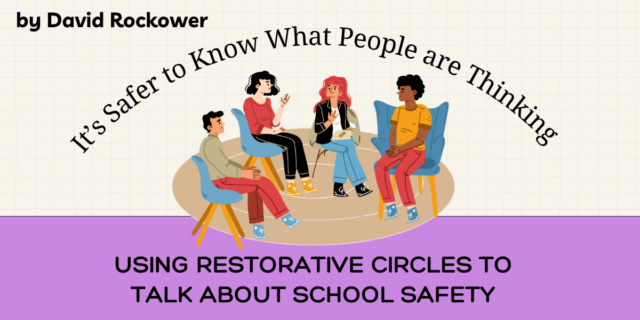
The following has been adapted from Elevating Equity and Justice by Robert Kim. Learn more at Heinemann.com.
Say you’re a teacher in a public school district. One day, as you begin a lesson, a student starts making loud guttural noises. You ask him to stop, but he keeps making the noises. The other students start laughing and imitating the student. You consider sending the student to the vice principal’s office, but then you remember that the student suffers from a behavioral disorder and has an IEP (a individual education plan). You quickly distribute a class assignment you’d been saving for later in the week and then counsel the disruptive student in the hallway.
The next day, during science class, a different student tells you that the upcoming reading on the evolution of the skulls from reptile to amphibian to mammal violates his religion as a Jehovah’s Witness. When you tell him he has to complete the reading and related assignment or receive an unsatisfactory grade, he says that you are violating his right to free exercise of his religion.
On day three, a Muslim student who is an immigrant to the United States confides in you that she (along with other Muslim and immigrant students) are being bullied at her bus stop and in the cafeteria. You wonder how you might support this student and other victims of bullying—and whether you have an obligation to report the conversation, even though you were asked to keep it a secret.
The preceding vignettes are fictional. But they are similar to very real situations that occur in schools every day. If you’ve taught in a K–12 setting, chances are you’ve had at least one similar experience. In one sense, these episodes depict the familiar challenge of student and classroom management. But they also raise several important topics with a legal dimension: Disability rights. Bullying and harassment. Free exercise of religion. Discrimination. These are, in fact, legal issues that swirl constantly around millions of teachers, administrators, and school personnel.
The connection between cases written by judges and the business of teaching may not seem obvious. Isn’t legal compliance the exclusive province of the school district lawyer, the board, or an administrator? In fact, educators act in ways, whether consciously or unconsciously, that have legal implications on a daily basis. And there are hundreds, even thousands of legal opinions out there that are relevant to teachers and other school personnel in some way. That’s because the actions of school employees are, in many instances, attributable to the larger school system. Schools can be held legally liable for the actions of their employees. And in some cases, individual officials or school staff can be held legally liable for their own actions.
Many important legal opinions do get analyzed by your school or district and reflected in some way in those annual legal compliance meetings you’ve attended (or agonized through). But others don’t. And it isn’t always made clear that a lot of the dos and don’ts educators are told about in these meetings have their origin in a judicial opinion. By the time it reaches you, chances are the story and the rich history of a particular opinion have been stripped away, leaving you with just the grist, the bottom line.
So, for this book, Bob Kim has selected just ten U.S. Supreme Court opinions involving public schools. Why these ten cases? Because they delve into some of the most important topics and situations educators face every day. They cover the landscape of both civil rights (discrimination) and civil liberties (individual freedom and privacy). Because they are U.S. Supreme Court cases, they impact the entire nation, not just one state or region. These are cases of historic impact that many people, not only educators, would benefit from knowing. And they’re just plain interesting: They involve real problems of real people who are raising legal and policy issues thorny and weighty enough to have reached the highest court in the land. To read them is to take a mini-course in the history of education in our nation.
Most fundamentally, these cases serve as a reference and compass for educators, whose role as moral and civic leaders is more important than ever as our democracy becomes increasingly divisive and our futures uncertain. Other than the parent, it is you, the educator, who have long been the first responder when it comes to guiding children in how to treat others and engage with the world. You may be the first one to teach a child how to speak and even disagree with others respectfully, how to be kind, how to treat someone different as an equal. How important are those skills these days?
Beyond you, the classroom and entire school are a hotbed of civic (and arguably legal) learning, both passive and active. Students observe whether and how the rules and policies of the classroom and school are implemented. They notice how students with different backgrounds and abilities are treated. Students of color. Students from other nations. Students learning English. Students with cognitive or physical disabilities. Their civic and rudimentary “legal” education is constant, and yet—as opposed to subjects like math or language arts or science—there are few instructional resources on what the foundational principles or learning outcomes are in this type of education.
The court cases is Elevating Equity and Justice illuminate these principles and outcomes for the educator. You may read them purely for your personal edification, but chances are you’ll also be drawn to reflect on what they mean for your teaching practice or your school. How can they help you address the needs of a particular student? What civic lessons do they teach? What values do they impart?
Reading these ten cases certainly won’t address every situation educators encounter. Nor does it count as legal advice. But it will provide insights into how educators may act appropriately, support students who are at risk or face unique challenges or needs, and perhaps even elevate the discussion, teaching, and practice of equity and justice at school.


Robert (Bob) Kim is a leading expert in education law and policy in the United States.
A former civil rights attorney, Bob is the co-author of Education and the Law, 5thed. and Legal Issues in Education: Rights and Responsibilities in U.S. Public Schools Today (West Academic Publishing, 2019 & 2017). He also wrote Let’s Get Real: Lessons and Activities to Address Name-calling & Bullying (Groundspark, 2004) and has advised thousands of educators on civil rights and school climate issues in public schools.
Bob currently serves as an education adviser and consultant on civil rights and equity issues. Through 2019, he was the William T. Grant Distinguished Fellow at Rutgers University, where he conducted research on school finance and education equity in U.S. public schools.
From 2011 through 2016, he served in the Obama Administration as Deputy Assistant Secretary in the U.S. Department of Education Office for Civil Rights, which enforces federal civil rights laws in K-12 and postsecondary institutions nationwide.
He has also served as a senior policy analyst at the National Education Association, where he advised school personnel on human and civil rights issues and worked to replace the No Child Left Behind Act.
Earlier in his career, as a staff attorney at the American Civil Liberties Union of Northern California, Bob engaged in litigation and advocacy pertaining to race, criminal and juvenile justice, bullying and harassment, LGBT rights, and student rights.
Bob holds a BA from Williams College and an JD from Boston College Law School.
Related Reading

In Chapter 5 of Youth Scribes: Teaching a Love of Writing, R. Joseph Rodríguez discusses "Living Antiracism and Equity." In the following adapted excerpt, he describes a writing assignment where students can question and analyze moments of antiracism.

The following is an adapted excerpt from Rebecca Bellingham and Veronica Scott's The Artful to Exploring Identity and Fostering Belonging. See the book for the figure version of this post.
